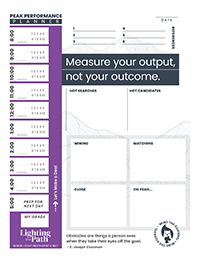A self-proclaimed expert once tried to sell me a new software system. It was fun to play with him for a few minutes, for me the time spent was very entertaining. Based on the number of calls and emails I receive, my name must hit most of the lists being passed around, causing inquiries for products and services that have no application to my business. It has gotten to become such a joke that I decided to turn the call into a research project: Are you really an expert?
David Little, Chairman, and CEO of DXP Enterprises, a Houston based industrial supply company that owns the distinction of being one of the fastest growing companies in its market sector, shared that he was looking for industry experts to join his company. DXP’s targeted growth rate is more than 20%, organically and through acquisitions. (Not bad for a $1.4 billion publicly traded company). For a brief moment, I thought he was going to describe Ivy League caliber education, technical knowledge capable of generating profound white papers on torque or pressure valves or welding techniques that resembled an artist. What he described were three defining traits that we should all have chiseled in stone in our offices.
- Willing to spend time to grow technical expertise of the product or service you provide. LaRue Coleman, President of JOBS/AMST shared that one of his key employees excitedly came to him to tell him of the latest book he read, The History of Paint. Not exactly a cliffhanger or Stephen King nail-biter, right? LaRue pointed to the focus and enthusiasm, you might call it passion, that was portrayed demonstrating the desire of not just knowing the business, but to make it a part of the way you think.
- How much time is spent in understanding the client’s business, not just the status of the purchase requirements? We solve problems today whether we are in sales, accounting, information technology, engineering or managing supply chain. Across the gamut of roles in any given corporation, is our desire to know and understand the needs of our clients and more importantly the business pressures that cause those needs. This is the reason we get brought into the inner sanctum of the decision maker’s lair. It truly, as Neil Rackham writes in SPIN Selling, is the chief difference between organizations.
- What do you do to improve your skill in your particular role or capabilities of selling or delivering your product or service? Consider the changes that have taken place just in the past 10-15 years in technology, global influences, and the receding hairlines of friends. Nothing stays the same and for that matter connectivity via email, web-based portals, iPads, PDA’s have accelerated the information processing curve not from days to hours to minutes. It is now in nanoseconds (my next watch will have a nanosecond hand). The buying influences in today’s market are in no way similar to just a few years ago. The internet has opened communication channels and marketing opportunities that have changed the landscape of corporate America.
Today’s expert will be tomorrow’s has been, not by what they know but rather by the attitude it requires to communicate with someone, to understand the issues they face, to succinctly describe possible solutions.
Often David’s definition of an expert rolls around in my mind. Do the people I interact with see me as an expert? Am I focused each day, not on what knowledge I carry but more importantly, about those I serve? Can I look at myself honestly enough to identify areas that I need to become more proficient at instead of resting on what I currently know or am capable of doing?




